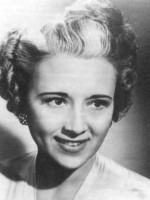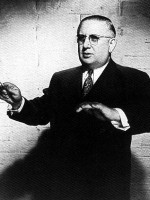Hattie McDaniel is a Actor American born on 10 june 1893 at Wichita (USA)
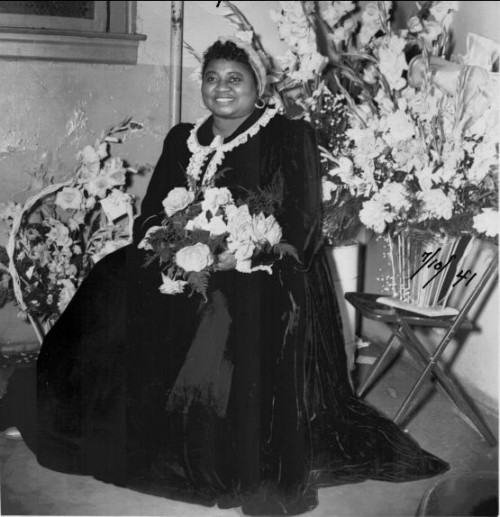
Hattie McDaniel (June 10, 1895 – October 26, 1952) was an American actress, singer-songwriter, and comedienne. She is best known for her role as Mammy in Gone with the Wind (1939) for which she won the Academy Award for Best Supporting Actress, making her the first African American to win an Academy Award.
In addition to acting in many films, McDaniel was a professional singer-songwriter, comedian, stage actress, radio performer, and television star; she was the first black woman to sing on the radio in the U.S. During her career, McDaniel appeared in over 300 films, although she received screen credits for only 80 or so.
McDaniel has two stars on the Hollywood Walk of Fame in Hollywood: one at 6933 Hollywood Boulevard for her contributions to radio and one at 1719 Vine Street for acting in motion pictures. In 1975, she was inducted into the Black Filmmakers Hall of Fame and in 2006 became the first black Oscar winner honored with a US postage stamp.
Dès 1909, elle quitte l’école pour chanter et danser au sein de la troupe de son frère Otis, The Mighty Minstrels. En 1911, Hattie se marie avec le pianiste Howard Hickman, et se lance dans la création de spectacles uniquement féminins. En 1916, son frère Otis décède, et la troupe commence à perdre de l’argent.
Au début des années 1920, McDaniel rejoint la troupe de George Morrison, Melody Hounds, et passe cinq ans en tournée aux Etats-Unis. Elle a alors l’opportunité de chanter à la radio pour la première fois avec les Melody Hounds, ce qui lui permettra d'accéder à une première reconnaissance du public. En 1922, McDaniel perd successivement son mari et son père. En 1932, elle fait ses débuts au cinéma où on la cantonnera essentiellement à des rôles de domestiques. En 1936, Show Boat lui vaut d'être une première fois remarquée.
À la suite du krach boursier de 1929, Mc Daniel est contrainte de prendre un travail de serveuse et plongeuse dans un club de Milwaukee, avant d'obtenir de son patron la possibilité de se produire sur scène. En 1931, elle rejoint son frère Sam et sa sœur Etta, artistes également à Los Angeles. Sam lui obtient une chronique à la radio, où elle interprète « Hi-Hat Hattie », une domestique qui ne « sait pas rester à sa place ». Elle devient alors extrêmement populaire, bien que ne recevant qu’un salaire misérable qui l’oblige à travailler comme domestique.
Mais c'est en 1939, avec son rôle de Mamma dans Autant en emporte le vent, qu'elle atteint la renommée. Le 15 décembre 1939, lors de la première mondiale au Fox Theater ségrégationniste à Atlanta, on lui interdit l'accès à la projection. Le 29 février 1940, elle obtient l'Oscar de la meilleure actrice dans un second rôle, devenant la première artiste noire à obtenir cette récompense. Vingt-quatre années s'écouleront avant de voir un autre acteur noir recevoir un Oscar dans le rôle principal (Sidney Poitier).
En 1938, Hattie se marie avec Howard Hickman, dont elle divorce la même année. Elle se remariera avec James Lloyd Crawford en 1941 puis Larry Williams en 1949.
Par la suite, l'actrice joue encore quelques rôles de domestique jusqu’à son dernier film, Family Honeymoon, en 1949. Elle reprend alors une carrière à la radio dans la série comique Beulah, puis joue dans l’adaptation télévisuelle de l’émission. Elle y prend la suite de l’actrice Ethel Waters, qui au terme de la première saison a critiqué les stéréotypes racistes liés au rôle. Au printemps 1952, McDaniel qui s’est découverte atteinte d’un cancer du sein, est trop malade pour continuer à travailler et laisse la place à Louise Beavers.
Hattie McDaniel meurt le 26 octobre 1952 à l’âge de 57 ans. Durant toute sa carrière, elle apparaît dans plus de 300 films, n’apparaît dans les crédits que de 80 films et joue 74 rôles de domestique.
Elle était la sœur des acteurs et chanteurs Otis McDaniel (1882-1916), Sam McDaniel (1886-1962) et Etta McDaniel (1890-1946).
Le racisme à Hollywood
Comme le montre Jill Watts dans l'ouvrage Hattie McDaniel: Black Ambition, White Hollywood, en tant que femme noire dans une société américaine ayant institutionnalisé la ségrégation raciale, McDaniel a souffert de nombreuses discriminations. Comme beaucoup d'acteurs noirs de cette période, elle a été cantonnée à des rôles racialement stéréotypés de domestiques, parfois pas même crédités au générique. Lorsqu'elle est récompensée par un Oscar pour son rôle dans Autant en emporte le vent, alors qu'elle n'a pas été autorisée à assister à la première du film, tout comme tous les acteurs noirs de l'époque, également exclus de toute la promotion du film dans les États du Sud. Même à Hollywood, lors de la cérémonie des Oscars, elle est contrainte de s’asseoir au dernier rang, réservé aux noirs, loin du reste de l'équipe du film. L'Oscar a d'ailleurs été reçu de manière contrastée par la communauté africaine-américaine. En saluant cette victoire, certains jugent que le film fait l’apologie du système esclavagiste. L’Oscar démontrait alors que seuls ceux qui acceptaient les stéréotypes racistes d’Hollywood pouvaient y avoir du succès. McDaniel est donc accusée de collaborer au maintien des stéréotypes racistes sur les noirs dans le cinéma hollywoodien.
Pourtant, même célèbre, McDaniel continue à subir la discrimination raciste. Lorsqu'elle s'installe à Hollywood au début des années 1940, dans le quartier de West Adams, un quartier alors majoritairement blanc mais attirant progressivement la bourgeoisie noire, au point d'être rebaptisé Sugar Hill, la jeune actrice défie la barrière raciale et subit le racisme des résidents blancs du quartier. Une association de quartier, la West Adams Height Improvement Association porte plainte et l'affaire monte jusqu'à la Cour suprême de Californie. L'association avance qu'en vendant des propriétés à des acheteurs noirs, les propriétaires blancs avaient violé la loi garantissant la ségrégation raciale dans le domaine de l'immobilier. Les propriétaires noirs de Sugar Hill, dont Hattie McDaniel, sont soutenus par les avocats de la National Association for the Advancement of Colored People (NAACP). La presse raciste ne manque pas de réagir : en illustrant son article d'une photographie de la demeure possédée par McDaniel, le journal Los Angeles Sentinel s'insurge sur sa première page "Les nègres de Californie peuvent désormais habiter partout!". En 1948, les défenseurs de Sugar Hill remportent néanmoins le procès.
Orientation sexuelle
Si McDaniel fut mariée quatre fois, sa bisexualité est souvent évoquée par les rumeurs hollywoodiennes et est toujours supposée jusqu'à aujourd'hui. On lui attribue une liaison avec l'actrice Tallulah Bankhead, évoquée par Kenneth Anger dans Hollywood Babylon. Pour la biographe de Hattie McDaniel, Carlton Jackson, il n'y a aucune preuve, hormis une déclaration ambiguë de Bankhead .
Source : Wikidata
Hattie McDaniel

- Infos
- Photos
- Best films
- Family
- Characters
- Awards
Nationality USA
Birth 10 june 1893 at Wichita (USA)
Death 26 october 1952 (at 59 years) at Los Angeles (USA)
Awards Academy Award for Best Supporting Actress
Birth 10 june 1893 at Wichita (USA)
Death 26 october 1952 (at 59 years) at Los Angeles (USA)
Awards Academy Award for Best Supporting Actress
Hattie McDaniel (June 10, 1895 – October 26, 1952) was an American actress, singer-songwriter, and comedienne. She is best known for her role as Mammy in Gone with the Wind (1939) for which she won the Academy Award for Best Supporting Actress, making her the first African American to win an Academy Award.
In addition to acting in many films, McDaniel was a professional singer-songwriter, comedian, stage actress, radio performer, and television star; she was the first black woman to sing on the radio in the U.S. During her career, McDaniel appeared in over 300 films, although she received screen credits for only 80 or so.
McDaniel has two stars on the Hollywood Walk of Fame in Hollywood: one at 6933 Hollywood Boulevard for her contributions to radio and one at 1719 Vine Street for acting in motion pictures. In 1975, she was inducted into the Black Filmmakers Hall of Fame and in 2006 became the first black Oscar winner honored with a US postage stamp.
Biography
Fille d'un père pasteur baptiste de Richmond (Virginie) et d'une mère originaire de Nashville (Tennessee).Dès 1909, elle quitte l’école pour chanter et danser au sein de la troupe de son frère Otis, The Mighty Minstrels. En 1911, Hattie se marie avec le pianiste Howard Hickman, et se lance dans la création de spectacles uniquement féminins. En 1916, son frère Otis décède, et la troupe commence à perdre de l’argent.
Au début des années 1920, McDaniel rejoint la troupe de George Morrison, Melody Hounds, et passe cinq ans en tournée aux Etats-Unis. Elle a alors l’opportunité de chanter à la radio pour la première fois avec les Melody Hounds, ce qui lui permettra d'accéder à une première reconnaissance du public. En 1922, McDaniel perd successivement son mari et son père. En 1932, elle fait ses débuts au cinéma où on la cantonnera essentiellement à des rôles de domestiques. En 1936, Show Boat lui vaut d'être une première fois remarquée.
À la suite du krach boursier de 1929, Mc Daniel est contrainte de prendre un travail de serveuse et plongeuse dans un club de Milwaukee, avant d'obtenir de son patron la possibilité de se produire sur scène. En 1931, elle rejoint son frère Sam et sa sœur Etta, artistes également à Los Angeles. Sam lui obtient une chronique à la radio, où elle interprète « Hi-Hat Hattie », une domestique qui ne « sait pas rester à sa place ». Elle devient alors extrêmement populaire, bien que ne recevant qu’un salaire misérable qui l’oblige à travailler comme domestique.
Mais c'est en 1939, avec son rôle de Mamma dans Autant en emporte le vent, qu'elle atteint la renommée. Le 15 décembre 1939, lors de la première mondiale au Fox Theater ségrégationniste à Atlanta, on lui interdit l'accès à la projection. Le 29 février 1940, elle obtient l'Oscar de la meilleure actrice dans un second rôle, devenant la première artiste noire à obtenir cette récompense. Vingt-quatre années s'écouleront avant de voir un autre acteur noir recevoir un Oscar dans le rôle principal (Sidney Poitier).
En 1938, Hattie se marie avec Howard Hickman, dont elle divorce la même année. Elle se remariera avec James Lloyd Crawford en 1941 puis Larry Williams en 1949.
Par la suite, l'actrice joue encore quelques rôles de domestique jusqu’à son dernier film, Family Honeymoon, en 1949. Elle reprend alors une carrière à la radio dans la série comique Beulah, puis joue dans l’adaptation télévisuelle de l’émission. Elle y prend la suite de l’actrice Ethel Waters, qui au terme de la première saison a critiqué les stéréotypes racistes liés au rôle. Au printemps 1952, McDaniel qui s’est découverte atteinte d’un cancer du sein, est trop malade pour continuer à travailler et laisse la place à Louise Beavers.
Hattie McDaniel meurt le 26 octobre 1952 à l’âge de 57 ans. Durant toute sa carrière, elle apparaît dans plus de 300 films, n’apparaît dans les crédits que de 80 films et joue 74 rôles de domestique.
Elle était la sœur des acteurs et chanteurs Otis McDaniel (1882-1916), Sam McDaniel (1886-1962) et Etta McDaniel (1890-1946).
Le racisme à Hollywood
Comme le montre Jill Watts dans l'ouvrage Hattie McDaniel: Black Ambition, White Hollywood, en tant que femme noire dans une société américaine ayant institutionnalisé la ségrégation raciale, McDaniel a souffert de nombreuses discriminations. Comme beaucoup d'acteurs noirs de cette période, elle a été cantonnée à des rôles racialement stéréotypés de domestiques, parfois pas même crédités au générique. Lorsqu'elle est récompensée par un Oscar pour son rôle dans Autant en emporte le vent, alors qu'elle n'a pas été autorisée à assister à la première du film, tout comme tous les acteurs noirs de l'époque, également exclus de toute la promotion du film dans les États du Sud. Même à Hollywood, lors de la cérémonie des Oscars, elle est contrainte de s’asseoir au dernier rang, réservé aux noirs, loin du reste de l'équipe du film. L'Oscar a d'ailleurs été reçu de manière contrastée par la communauté africaine-américaine. En saluant cette victoire, certains jugent que le film fait l’apologie du système esclavagiste. L’Oscar démontrait alors que seuls ceux qui acceptaient les stéréotypes racistes d’Hollywood pouvaient y avoir du succès. McDaniel est donc accusée de collaborer au maintien des stéréotypes racistes sur les noirs dans le cinéma hollywoodien.
Pourtant, même célèbre, McDaniel continue à subir la discrimination raciste. Lorsqu'elle s'installe à Hollywood au début des années 1940, dans le quartier de West Adams, un quartier alors majoritairement blanc mais attirant progressivement la bourgeoisie noire, au point d'être rebaptisé Sugar Hill, la jeune actrice défie la barrière raciale et subit le racisme des résidents blancs du quartier. Une association de quartier, la West Adams Height Improvement Association porte plainte et l'affaire monte jusqu'à la Cour suprême de Californie. L'association avance qu'en vendant des propriétés à des acheteurs noirs, les propriétaires blancs avaient violé la loi garantissant la ségrégation raciale dans le domaine de l'immobilier. Les propriétaires noirs de Sugar Hill, dont Hattie McDaniel, sont soutenus par les avocats de la National Association for the Advancement of Colored People (NAACP). La presse raciste ne manque pas de réagir : en illustrant son article d'une photographie de la demeure possédée par McDaniel, le journal Los Angeles Sentinel s'insurge sur sa première page "Les nègres de Californie peuvent désormais habiter partout!". En 1948, les défenseurs de Sugar Hill remportent néanmoins le procès.
Orientation sexuelle
Si McDaniel fut mariée quatre fois, sa bisexualité est souvent évoquée par les rumeurs hollywoodiennes et est toujours supposée jusqu'à aujourd'hui. On lui attribue une liaison avec l'actrice Tallulah Bankhead, évoquée par Kenneth Anger dans Hollywood Babylon. Pour la biographe de Hattie McDaniel, Carlton Jackson, il n'y a aucune preuve, hormis une déclaration ambiguë de Bankhead .
Best films
Usually with
Filmography of Hattie McDaniel (83 films)
Actress
 , 2h4
, 2h4Origin USA
Genres Documentary
Themes Films about films, Documentary films about business, Documentary films about the film industry, Documentary films about films
Actors Christopher Plummer, George Cukor, David Selznick, Arthur E. Arling, Tallulah Bankhead, Susan Hayward
Roles Self (archive footage)
Rating84%






The Big Wheel (1949)
, 1h32Directed by Edward Ludwig
Origin USA
Genres Drama, Comedy, Action, Romance
Themes Sports films, Transport films, Films about automobiles, Auto racing films, Road movies
Actors Mickey Rooney, Allen Jenkins, Thomas Mitchell, Mary Hatcher, Michael O'Shea, Spring Byington
Roles Minnie
Rating56%





Billy Coy (Mickey Rooney) from Carrell in California wants to be a race car driver. He manages to get hired as a mechanic by Arthur "Red" Stanley (Thomas Mitchell) at his garage, after mentioning that he is the son of a famous driver called "Cannonball" Coy. Billy's father died in an accident at the Indianapolis 500 a few years ago.
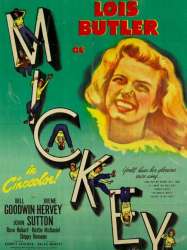
Mickey (1948)
, 1h27Directed by Ralph Murphy
Origin USA
Genres Drama, Comedy
Actors Irene Hervey, Hattie McDaniel, Skip Homeier, John Sutton, Rose Hobart, Beverly Wills
Roles Bertha
Rating62%





The plotline involves a young tomboy named Mickey (Butler) with a beautiful singing voice, who is torn between singing and playing on her baseball team. Meanwhile, Mickey trying to make her widowed father fall in love with her neighbor's aunt, Louise (Hervey), a woman who is helping Mickey try to be more ladylike so she can become her best friend's love interest.

Family Honeymoon (1948)
, 1h30Directed by Claude Binyon
Origin USA
Genres Comedy
Themes Films about families
Actors Claudette Colbert, Fred MacMurray, Rita Johnson, William H. Daniels, Gigi Perreau, Hattie McDaniel
Roles Phyllis
Rating63%





Katie Armstrong (Claudette Colbert) is a young widow and mother of three children - Charlie (Jimmy Hunt), Abner (Peter Miles) and Zoe (Gigi Perreau). She is also engaged to be married to botany professor Grant Jordan (Fred MacMurray). Grant is seeking funds to raise a new botany research building on the university campus where he works, and the most influential person to convince in this quest is his chancellor, Richard Fenster Paul Harvey. Grant used to be involved with the chancellor’s daughter, Minna (Rita Johnson), and is surprised, to say the least, when Minna crashes his bachelor party. Minna also almost succeeds in completely ruining Katie’s engagement party. When Katie hears about Minna’s visit at the bachelor party, Grant does his best to assure her that Minna is a finished chapter in his book, but he also has a hard time completely ignoring her, since he needs to be on good foot with the chancellor himself.

The Flame (1947)
, 1h37Directed by John H. Auer
Origin USA
Genres Drama, Crime
Actors John Carroll, Vera Ralston, Robert Paige, Broderick Crawford, Henry Travers, Blanche Yurka
Roles Celia
Rating64%





A man (Carroll) induces an ambitious nurse (Ralston) to marry his rich brother (Paige) for the money who has a terminal disease.

Song of the South (1946)
, 1h34Directed by Wilfred Jackson, Harve Foster
Origin USA
Genres Musical, Animation
Themes Films about animals, Films about magic and magicians, Films about music and musicians, Mise en scène d'un lapin ou d'un lièvre, Musical films, Children's films, Mise en scène d'un mammifère
Actors James Baskett, Bobby Driscoll, Luana Patten, Ruth Warrick, Lucile Watson, Hattie McDaniel
Roles Aunt Tempy
Rating68%





Seven-year-old Johnny is excited about what he believes to be a vacation at his grandmother's Georgia plantation with his parents, John Sr. and Sally. When they arrive at the plantation, he discovers that his parents will be living apart for a while, and he is to live in the country with his mother and grandmother while his father returns to Atlanta to continue his controversial editorship in the city's newspaper. Johnny, distraught because his father has never left him or his mother before, leaves that night under cover of darkness and sets off for Atlanta with only a bindle. As Johnny sneaks away from the plantation, he is attracted by the voice of Uncle Remus telling tales "in his old-timey way" of a character named Br'er Rabbit. Curious, Johnny hides behind a nearby tree to spy on the group of people sitting around the fire. By this time, word has gotten out that Johnny is gone and some plantation residents, who are sent out to find him, ask if Uncle Remus has seen the boy. Uncle Remus replies that he's with him. Shortly afterwards, he catches up with Johnny, who sits crying on a nearby log. He befriends the young boy and offers him some food for the journey, taking him back to his cabin.

Never Say Goodbye (1946)
, 1h37Directed by James V. Kern
Origin USA
Genres Comedy, Romantic comedy
Actors Errol Flynn, Eleanor Parker, Lucile Watson, S.Z. Sakall, Forrest Tucker, Donald Woods
Roles Cozy
Rating66%





Divorced New York couple Phil and Ellen Gayley each buy a winter coat for their seven-year-old daughter Phillippa, known as "Flip". Flip has spent the last six months with her father but is about to move in with her mother.
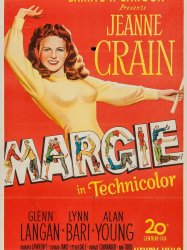
Margie (1946)
, 1h35Directed by Henry King
Origin USA
Genres Drama, Comedy, Comedy-drama, Romantic comedy, Romance
Actors Jeanne Crain, Lynn Bari, Glenn Langan, Alan Young, Barbara Lawrence, Conrad Janis
Roles Cynthia
Rating71%





In 1946, Margie (Jeanne Crain) is a housewife reminiscing about her high school days with her own teenage daughter, who has just discovered her mother's old photo album in the attic. In a flashback to the 1920s, Margie is a high-spirited girl living with her dominant but good-hearted Grandmother McSweeney (Esther Dale). Her mother has died and her father (Hobart Cavanaugh), the local mortician, lives apart from Margie and her grandmother, only visiting on Wednesday due to his busy work schedule, and sometimes not even staying long enough to see his daughter. The youngest girl in her class, Margie does very well at her schoolwork, but she is not socially adept and wears old-fashioned clothing, including bloomers that frequently fall down. By contrast, her pretty and fashionable neighbor Marybelle Tenor (Barbara Lawrence) wears short skirts and lipstick and dates the popular but dimwitted captain of the football team, Johnny Green (Conrad Janis). Margie secretly has a crush on Johnny, but he regards her as a "pain in the neck". When Margie meets the handsome new French teacher at her high school, Professor Ralph Fontayne (Glenn Langan), she becomes even more smitten with him, and he seems to take an interest in her as well. Meanwhile, Margie's bumbling classmate Roy Hornsdale (Alan Young) is in love with her, and constantly attempts to court her despite her disinterest in him.
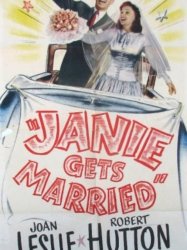
Janie Gets Married (1946)
, 1h29Directed by Vincent Sherman
Origin USA
Genres Comedy, Romantic comedy
Actors Joan Leslie, Robert Hutton, Edward Arnold, Ann Harding, Robert Benchley, Dorothy Malone
Roles April
Rating60%





Dick Lawrence revient de guerre dans sa bonne ville d'Hortonville. Il y retrouve sa mère Thelma, son beau-père John et surtout sa charmante petite amie Janie Conway, à laquelle il ne tarde pas à se fiancer puis à se marier. La jeune femme, qui trouve son époux encore trop peu adapté à la vie civile, va tout faire le réformer... en toute discrétion.

Since You Went Away (1944)
, 2h57Directed by Edward F. Cline, John Cromwell, Tay Garnett, David Selznick
Origin USA
Genres Drama, War, Romance
Themes Political films
Actors Claudette Colbert, Jennifer Jones, Shirley Temple, Joseph Cotten, Monty Woolley, Lionel Barrymore
Roles Fidelia
Rating74%





Anne Hilton (Claudette Colbert) is an upper-middle-class housewife living in a Midwestern town near a military base with her two teenage daughters, Jane (Jennifer Jones) and Bridget "Brig" (Shirley Temple). Anne's beloved husband Tim Hilton - seen only in photographs - is the father of Jane and Brig, has volunteered for U.S. Army service in World War II. As the film begins in January 1943, Anne has just returned from seeing her husband off to Camp Claiborne, and she and her daughters must adjust to the absence of Tim and make other sacrifices for the war effort, including food rationing; planting a victory garden; giving up the services of their loyal maid Fidelia (Hattie McDaniel) who nevertheless offers to continue working part time for the Hiltons while foregoing wages; and taking in a boarder, the curmudgeonly retired Colonel Smollett (Monty Woolley). When the Hiltons travel by train in a failed attempt to see Tim one last time before he ships out, they encounter or travel with many other people whose lives have been affected by the war, and they end up not getting to see Tim because their train is delayed to allow a defense supply train to go through first. In contrast, the Hiltons' socialite neighbor Emily Hawkins (Agnes Moorehead) complains about the inconveniences caused by the war and engages in unsupportive behaviors such as hoarding food and criticizing the Hiltons' efforts.
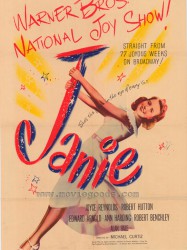
Janie (1944)
, 1h42Directed by Michael Curtiz
Origin USA
Genres Comedy, Romantic comedy, Romance
Themes Théâtre, Films based on plays
Actors Joyce Reynolds, Edward Arnold, Robert Hutton, Ann Harding, Alan Hale, Robert Benchley
Roles April, Conway's Maid
Rating59%





Janie is a free spirited teenage girl living in a small town. World War II brings the establishment of an army camp nearby. Janie and her bobby soxer friends have their hearts set afire by the prospect of so many young soldiers so close.
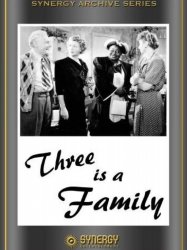
3 Is a Family (1944)
, 1h21Directed by Edward Ludwig, John E. Burch
Origin USA
Genres Comedy
Themes Théâtre, Films based on plays
Actors Marjorie Reynolds, Charles Ruggles, Fay Bainter, Helen Broderick, Arthur Lake, Hattie McDaniel
Roles Maid
Rating52%





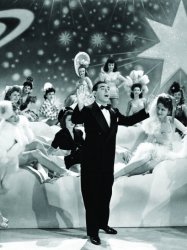
Thank Your Lucky Stars (1943)
, 2h4Directed by David Butler
Origin USA
Genres Comedy, Musical
Themes Films about music and musicians, Musical films
Actors Eddie Cantor, Joan Leslie, Dennis Morgan, Edward Everett Horton, S.Z. Sakall, Hattie McDaniel
Roles Gossip in "Ice Cold Katie" Number
Rating66%





Theater producers (Horton and Sakall) staging a wartime charity program, only to have the production taken over by their egotistical star (Eddie Cantor). Meanwhile, an aspiring singer (Dennis Morgan) and his songwriter girlfriend (Joan Leslie) conspire to get into the charity program by replacing Cantor with their look-alike friend, tour bus driver Joe Simpson (Eddie Cantor).

Johnny Come Lately (1943)
, 1h37Directed by William K. Howard
Origin USA
Genres Drama
Actors James Cagney, Grace George, Marjorie Main, Marjorie Lord, Hattie McDaniel, William Henry
Roles Aida
Rating67%





In 1906, Tom Richards (James Cagney), a drifter, arrives in Plattsville and befriends newspaper proprietor Vinnie McLeod (Grace George), who is battling the corruption of the town's leading citizen Bill Dougherty (Edward McNamara). He takes over as managing editor of the Plattsville "Shield and Banner" and, despite initial resistance from the oppressed citizens, finally drives Dougherty out of town.

The Male Animal (1942)
, 1h41Directed by Elliott Nugent
Origin USA
Genres Comedy, Romantic comedy, Romance
Themes Films about education, Films based on plays
Actors Henry Fonda, Olivia de Havilland, Joan Leslie, Jack Carson, Eugene Pallette, Hattie McDaniel
Roles Cleota
Rating65%





Tommy Turner (Henry Fonda) is an English teacher at football-crazed Midwestern University. Although he is uninvolved with the politics of the day, Tommy suddenly finds himself the center of a free-speech debate on campus. An editorial in a student magazine praises him for planning to read Bartolomeo Vanzetti's sentencing statement to his class as an example of eloquent composition, even in broken English composed by a non-professional.
 Connection
Connection


